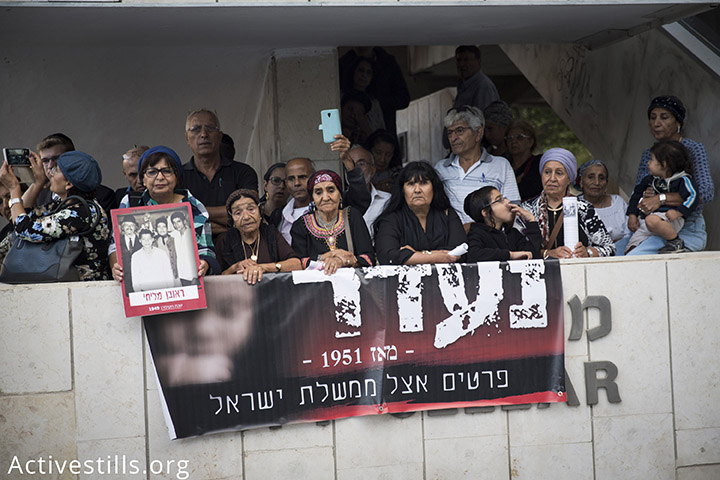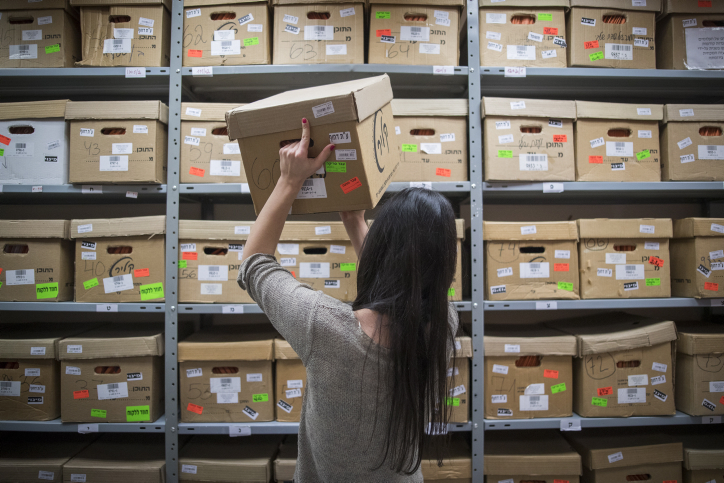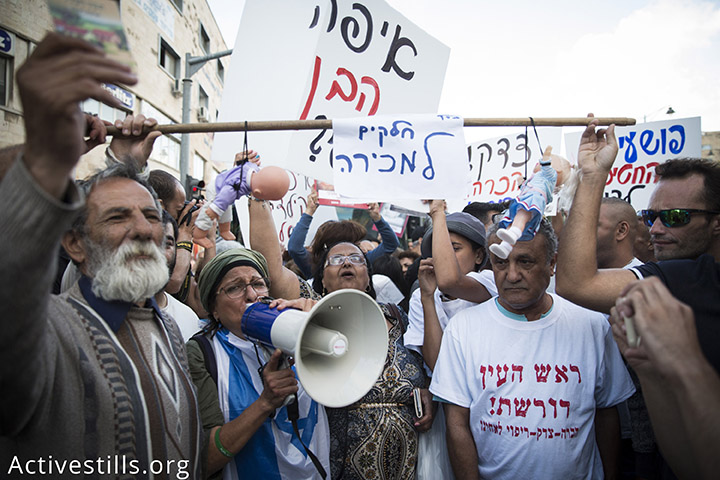After 60 years of covering up the disappearance of hundreds of Yemeni babies in the early years of the state, the time has come for justice and accountability.

There were moments during Wednesday night’s rally to commemorate the Yemenite children affair in which I wondered how the tiles beneath us, in Jerusalem’s Mashbir Square, failed to crack under the unbearable weight of pain and grief.
Veteran Jerusalemites will likely remember this plaza as “Talita Komi,” one of the city’s most vibrant areas. On Fridays people would stand here and deliver speeches to passersby, on Saturday evenings it was where young men and women would come to meet each other, long before the age of cellphones. On Wednesday evening, the plaza suddenly reverted back to its golden age.
Over 2,000 men and women, young people with babies in their arms, elderly who used wheelchairs and walkers to get around, parents and children, filled the square to the brim — all of them demanding recognition, justice, and redress for the Yemenite children who were disappeared by the state in Israel’s nascent years. Police didn’t disperse the dozens of demonstrators who blocked King George Street, one of downtown Jerusalem’s main thoroughfares.
On stage, speaker after speaker delivered their testimony about the disappearance of brothers or daughters during the early years of the state, after they arrived in Israel. These were testimonies that had never been delivered before a court. Yet with the trembling power of their words they defiantly turned the square into a courtroom where they could finally tell stories that had been silenced, ridiculed, and denied for so many years. Beyond it all, however, people simply spoke to one another. They held up photos of their disappeared loved ones, they listened, they cried.
Usually we come to protests with a desire to make our voices heard. To call out and scream. On Wednesday that scream was heard in our very presence, and the most active thing we could do was listen to the testimonies. I think that for many of us who protest regularly, it was an incredible lesson in humility. The ability to listen to the stories that our minds refuse to process, detailed in the most beautiful Hebrew I have ever heard at a demonstration. Testimonies that don’t miss a beat, and even after 60 years still feel so alive and heartrending.

There were testimonies of Yemeni women who understood what was happening around them and would hide their newly-born babies under the bed every time a social worker or nurse came in. There was the testimony of a mother who would wrap herself in blankets, or any piece of cloth she could find, to hide the fact that she was pregnant. Or the testimony of a father who refused to believe that his daughter had died, who headed to the hospital, locked the doctor and the nurse in a room and warned them that he wouldn’t leave without his daughter. His daughter was quickly returned to him after she magically “came back to life.” Now his daughter stands before me, reciting this chilling story.
There were testimonies that described how families were ordered to forgo all their jewelry and holy books before boarding the plan to the holy land, so that they don’t “weigh down the plane and cause a crash.” These families were promised that their belongings would arrive on a different plane, yet they never saw them again. As I listened to these stories, deep in my heart I begged for forgiveness from Rabbi Uzi Meshulam — who paid a heavy price 20 years ago for exposing the sheer scope of the kidnappings — for buying into the lies the establishment told about him. For giving in to the evil demonizations, and for the many years that passed before I began to understand the justness of his struggle.

I listened to these stories when, out of the corner of my eye, I spotted Baruch Marzel and Benzi Gopstein — two extremist right-wing leaders who stop at nothing to try and spread their poisonous ideas. Then I remembered the solidarity shown by MKs Jamal Zahalka and Yousef Jabareen (Joint List), representatives of a community that knows full well what this colonial and racist mentality can do to those whom it marks as the the “inferior Other.” I wondered on which side the Marzels and the Gopsteins and Jabareen and Zahalka were 60 years ago, in the division between the kidnappers and the liars on one hand, and their victims on the other.
At the end of the evening, as I wandered away from the protest, I heard the Jewish Sh’ma prayer blaring out of the speakers. “Sh’ma Israel.” Hear, O Israel. This command, to hear, was the most fitting ending to the evening because hearing is the most basic step before taking action. I am grateful for all those who came to tell their stories, and am conscious of the moral responsibility we have to pass on this knowledge and work to bring about justice. Recognition, justice, redress.
Like the Truth and Reconciliation Commission in South Africa, or anywhere else where the victims fight to undo the injustice done to them, recognizing the injustice of the Yemenite children’s affair and revealing the truth comes before reconciliation and redress. After so many years of doubt and hopelessness, it is time that the state take responsibility for the injustice and pain it caused these people.
Sh’ma Yisrael. After 60 years, the time has come.
A version of this post was originally published in Hebrew on Local Call.

